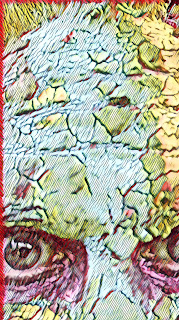we feature today a rare interview with sadoo
diaper who we under
stand recently has been dressing up and roaming city streets alone. sadoo! – we know you’re strange but isn’t this a bit much?
stand recently has been dressing up and roaming city streets alone. sadoo! – we know you’re strange but isn’t this a bit much?
most days it isn’t but sometimes i get
home and think i should have done a k less or so.
i mean socially.
socially?
society, while in this case moderately and
superficially tolerant, has, like everything, its limits, and it’s given to
excise any excessively aberrant aspect to guarantee its own survival.
shouldn’t it then be excising itself? look.
it’s possible various specimens among the masses don’t like my makeup or
sartorial expression but that’s neither illegal nor even particularly aberrant.
at worst some might consider it to be unfashionable, incomprehensible,
distasteful, irrelevant, inappropriate or obnoxious.
i gave up on why many years ago. and giving up on why led to giving up on you and i and he and she and it and they. this led me
to give up on doing. the copulative
followed. so you see your question is more or less an empty set of emptiness.
if anything, i’m doing this to not do.
what do you mean sadoo? or should it be
sanotdoo?
snotdoo might
doodoo. i mean (if i mean, which i doubt, often finding meaning too mean) that i may be dooing but i’m dooing without purpose (dooing with purpose we could call doing) and this without is linked somehow to this biochemical technical conglomerate (what we could call the inhabited body that maintains an appearance of speaking in the republic of the present) being attuned to different frequencies than those emitted by the worlds of doing – those worlds we could for
convenience call capitalism and which we humans are all now born into, regardless of any attunement with it, rousing all manner of defects and strategies among the misattuned for survival – a survival that isn’t simply an animal protection of their singularities but an aspect of attempting to nurture (rather than destroy) biodiversity, which surely exists not only in the forests and oceans of the world but also our cities and souls, these new and critical habitats.
doodoo. i mean (if i mean, which i doubt, often finding meaning too mean) that i may be dooing but i’m dooing without purpose (dooing with purpose we could call doing) and this without is linked somehow to this biochemical technical conglomerate (what we could call the inhabited body that maintains an appearance of speaking in the republic of the present) being attuned to different frequencies than those emitted by the worlds of doing – those worlds we could for
convenience call capitalism and which we humans are all now born into, regardless of any attunement with it, rousing all manner of defects and strategies among the misattuned for survival – a survival that isn’t simply an animal protection of their singularities but an aspect of attempting to nurture (rather than destroy) biodiversity, which surely exists not only in the forests and oceans of the world but also our cities and souls, these new and critical habitats.
i’m not sure i follow.
no need to follow.
capitalistic structures and processes work
great for some of the human population (but hardly outside the human). it’s hard to quantify this as most humans are
automatically enculturated into capitalism and never question it. if i’m
protesting i might be protesting (most generally) humanity's strategic
imbecility (and tactical implementations of this imbecility) – that as a
species we're investing most of our time, money, and energy into our hyperapex
predator attributes (slaughtering more and better than anything else) and
little into what for me is our most distinctive talent – a kind of empathic
consciousness that allows us to contextualize ourselves (individually and
collectively) as part of vast and intelligent ecosystems and adapt our lives to
this broader knowledge. more specifically, objecting to anthropocentrism
(speciesism), its concomitant ecological degradation – and the political-lifestyle
machineries we in our mob conformity are enculturated into.
how will people get that – you look like the
offspring of a
jovian clown and the dropped insides of a second generation laptop?
jovian clown and the dropped insides of a second generation laptop?
i was told today i look like goku. but your question’s misplaced – it assumes there’s something
to get, that my presentation – whether through image or text – is a tradable
commodity on the image-text exchange. to put it another way, judeochristiancapitalistic
society wears reason on its body of unreason. i wear unreason on my body of
reason.
what?
next – sadood ii














